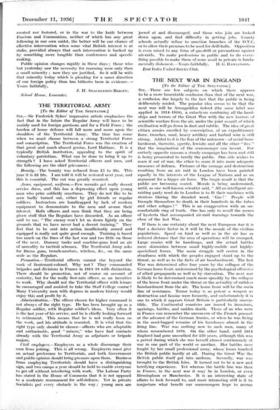THE TERRITORIAL ARMY
[To the Editor of THE SPECTATOR.] SIR,—Sir Frederick Sykes' impressive article emphasises the fact that in the future the Regular Army will have to be mainly used for foreign garrisons and for a Field Force ; the burden of home defence will fall more and more upon the shoulders of the Territorial Army. The time has come when we must choose between a strong Territorial Force and conscription. The Territorial Force was the creation. of that great and much abused genius, Lord Haldane. It is a typically British institution, appealing to the spirit of voluntary patriotism. What can be done to bring it up to strength ? I have asked Territorial officers and men, and the following are the chief grievances :
. Bounty.—The bounty was reduced from £5 to 30s. This year it is £3 10s. I am told it will be restored next year, and this is essential. The cut was greatly resented.
Arms, equipment, uniform.—Few recruits get really decent service dress, and this has a depressing effect upon young men who prize soldierly smartness. They do not like to be seen badly turned out, either by girl friends or regular soldiers. Instructors are handicapped by lack of modern equipment to demonstrate to the men and arouse their interest. Both officers and men think that they are being given stuff that the Regulars have discarded. As an officer said to me, "The enemy won't let us down lightly on the grounds that we have never had a decent training." They feel that to be sent into action insufficiently armed and equipped is really not quite good enough. Training is based too much on the lines of the last war and too little on those of the next. Dummy tanks and machine-guns lend an air of unreality to tactical schemes. The Territorial Army asks for Brenn guns, trench-mortars, wireless, &c., on the same scale as the Regulars.
Promotion—Territorial officers cannot rise beyond the rank of lieutenant-colonel. Why not ? They commanded brigades and divisions in France in 1914-18 with distinction. There should be promotion, not of course on account of seniority, but for the really first-rate officer, as an incentive to work. Why should not the Territorial officer with leisure be encouraged and assisted to take the Staff College course ? Many University men with degrees in modern history would enjoy this and profit by it.
Administration.—The officer chosen for higher command is not always of the right type. He has been brought up as a Regular soldier, with Regular soldier's ideas. Very often it is the last year of his service, and he is chiefly looking forward to retirement. This means that he is not really keen on the work, and his attitude is resented. It is vital that the right type only should be chosen—officers who are adaptable and enthusiastic, good "mixers," who have had contacts already with the Territorial Army as adjutants or brigade majors.
Civil employers.—Employers as a whole discourage their men from joining. This is all wrong. Employers must give an actual preference to Territorials, and both Government and public opinion should bring pressure upon them. Business firms employing Territorials should have a distinguishing sign, and two camps a year should be held to enable everyone to get off without interfering with work. The Labour Party has stated in the House of Commons that it is not opposed to a moderate rearmament for self-defence. Yet in private Socialists put every obstacle in the way ; young men are jeered at and discouraged, and those who join are looked down upon, and find difficulty in getting jobs. County schools actually refuse to sanction branches of the O.T.C. or to allow their premises to be used for drill-halls. Opposition is even raised to any form of gas-drill or precautions against air-raids. To make professions in public and to do every- thing possible to make them of none avail in private is funda- mentally dishonest.—Yours faithfully, H. G. RAWLINSON.
East India United Service Club.
















































 Previous page
Previous page